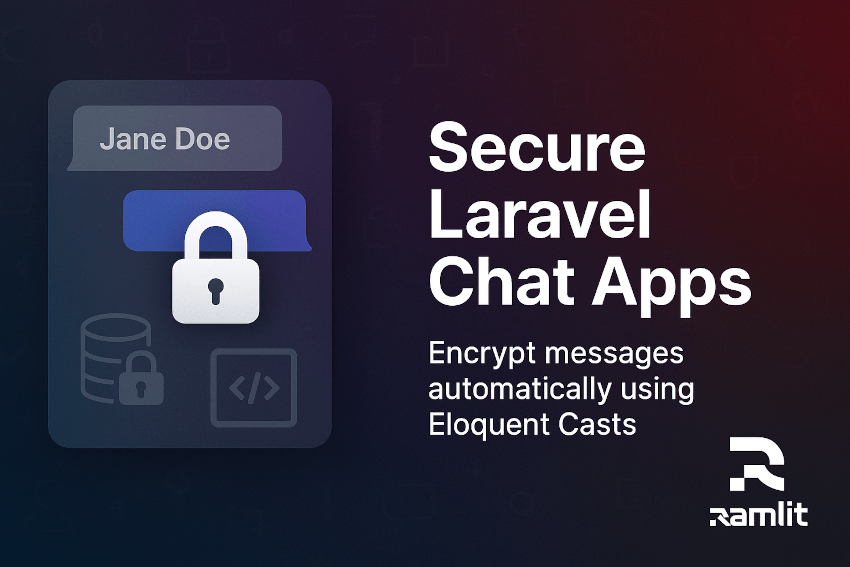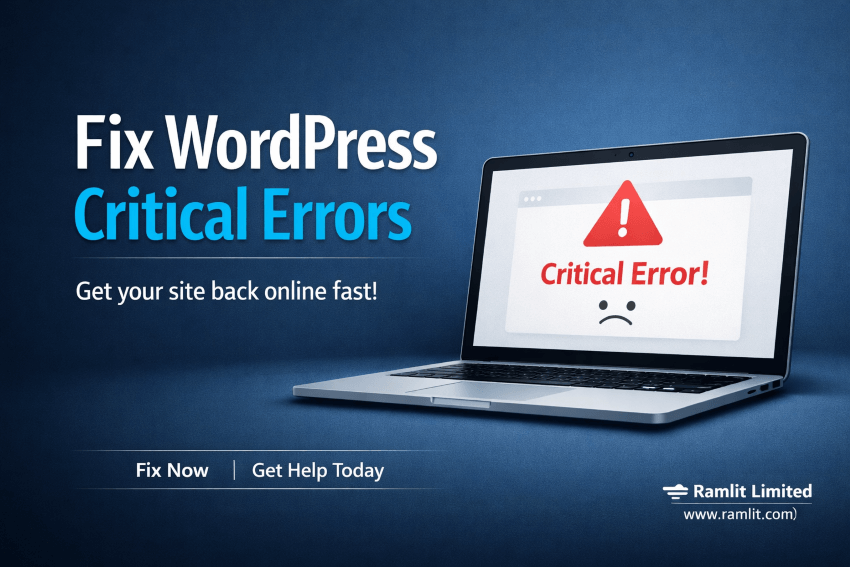Laravel Chat Security: How to Protect Messages with Automatic Encryption
Introduction
Every successful chat app relies on trust. Whether you’re building a business collaboration tool, a healthcare messaging platform, or a fintech chat system, your users expect privacy. If messages aren’t encrypted, a single data breach could expose sensitive conversations — leading not just to lost revenue, but also a permanent loss of trust.
Laravel makes building chat applications fast and elegant, but developers often overlook one critical piece: message encryption. Out of the box, messages saved in the database sit in plain text, making them readable to anyone with unauthorized access.
That’s a serious problem.
The good news? Laravel provides a simple, developer-friendly way to automatically encrypt and decrypt chat messages using Eloquent Casts. This approach ensures every message stored in your database is secure — without forcing you to rewrite queries or complicate your workflow.
In this guide, you’ll learn:
- Why encrypting chat messages is no longer optional for modern apps
- How Laravel handles encryption behind the scenes
- A step-by-step walkthrough to implement automatic message encryption with Eloquent Casts
- Common pitfalls and how to avoid them
- Best practices to balance performance, compliance, and user experience
By the end, you’ll know exactly how to build secure, scalable Laravel chat apps that protect your users and earn their trust.
Why Encrypting Chat Messages Matters
User Trust and Privacy
Modern users are privacy-aware. If your app handles financial discussions, healthcare data, or corporate secrets, they’ll want proof their data is safe. Without encryption, even an internal database leak could expose conversations.
Legal Compliance
Regulations like GDPR (Europe), HIPAA (U.S. healthcare), and local privacy laws increasingly demand encrypted communication. Failure to comply could mean not only reputational damage but also hefty fines.
Real-World Breach Risks
Think about what happens if hackers gain access to your database backups or logs. Plaintext chat messages could be leaked in minutes. With encryption, even if attackers steal data, it’s unreadable without the decryption key.
Bottom line: Without encryption, your Laravel chat app is a liability. With it, you transform risk into trust and compliance.
How Laravel Handles Encryption
Laravel ships with a powerful Crypt facade, which uses OpenSSL and AES-256 encryption under the hood. This means:
- Data encrypted with Laravel can only be decrypted with your app’s unique key (stored in
.env). - Encrypted data looks like random strings, impossible to read without the key.
- Laravel handles both encryption and decryption seamlessly, so you don’t need to manually code algorithms.
But encrypting every message manually would be tedious. That’s where Eloquent Casts shine.
What Are Eloquent Casts?
Eloquent Casts allow you to automatically transform attributes when saving or retrieving them from the database. Normally, developers use casts for data types — for example, casting JSON to an array. But you can also create custom casts, like encryption.
Think of it as a middleware for your database fields:
- When saving → Laravel automatically encrypts the value.
- When retrieving → Laravel automatically decrypts the value.
This means you write less code, avoid human error, and guarantee consistent encryption across your app.
Step-by-Step Guide: Encrypting Laravel Chat Messages with Eloquent Casts
Step 1: Create a Custom Cast
Run the Artisan command:
php artisan make:cast Encrypted
This generates a Encrypted.php file inside App/Casts/.
Step 2: Implement Encryption Logic
Open the Encrypted.php file and update it:
<?php
namespace App\Casts;
use Illuminate\Contracts\Database\Eloquent\CastsAttributes;
use Illuminate\Support\Facades\Crypt;
class Encrypted implements CastsAttributes
{
public function get($model, string $key, $value, array $attributes)
{
return $value !== null ? Crypt::decryptString($value) : null;
}
public function set($model, string $key, $value, array $attributes)
{
return $value !== null ? Crypt::encryptString($value) : null;
}
}
Here’s what happens:
set()encrypts the message before saving it.get()decrypts it when retrieving.
Step 3: Apply Cast in Your Model
In your Message.php model:
<?php
namespace App\Models;
use Illuminate\Database\Eloquent\Model;
use App\Casts\Encrypted;
class Message extends Model
{
protected $casts = [
'content' => Encrypted::class,
];
}
Now, anytime you create or fetch a message:
$message = new Message();
$message->content = "This is a private chat.";
$message->save();
// In database: Encrypted gibberish
// When retrieved:
echo $message->content;
// Output: "This is a private chat."
Performance Considerations
Encryption adds overhead. Here’s how to balance security vs. performance:
- Only encrypt fields that require privacy (e.g., message body, not message IDs).
- Use queue workers if encrypting massive amounts of data.
- Cache frequently accessed decrypted values when possible.
Common Pitfalls to Avoid
- Forgetting Indexing Issues: Encrypted fields can’t be indexed for search. Consider storing metadata separately.
- Hardcoding Keys: Always store your encryption key in the
.envfile, never in code. - Mixing Plaintext and Encrypted Data: Ensure migrations and tests account for encryption consistently.
Best Practices for Secure Laravel Chat Apps
- Rotate encryption keys periodically using Laravel’s key management tools.
- Use HTTPS/TLS so data is protected in transit as well as at rest.
- Implement role-based access to restrict who can view decrypted messages.
- Monitor logs for suspicious database activity.
Business Benefits of Automatic Encryption
This isn’t just about code — it’s about ROI:
- Protects your brand reputation by preventing breaches.
- Builds customer loyalty by proving you care about privacy.
- Speeds up compliance audits, reducing regulatory stress.
- Future-proofs your app, as data laws tighten worldwide.
Bullet Points / Quick Takeaways
- Laravel’s Crypt facade provides strong AES-256 encryption.
- Eloquent Casts let you automate encryption and decryption.
- Only encrypt sensitive fields to balance performance.
- Encrypted data is unreadable even if your database is breached.
- Automatic encryption boosts trust, compliance, and scalability.
Call to Action (CTA)
Ready to secure your Laravel chat app? Don’t wait until a breach damages your brand. Implement automatic message encryption today and protect your users’ privacy.
👉 Need expert help with Laravel security or app development? Contact our team at Ramlit Limited and let’s build something secure together.
8. Optional FAQ Section
Q1: Can encrypted fields be searched in Laravel? No. Since encrypted data is randomized, you can’t run LIKE queries. Store searchable metadata separately.
Q2: Will encryption slow down my Laravel app? Minimal overhead for most apps. For high-volume apps, use caching and queues to optimize performance.
Q3: Is Laravel’s Crypt secure enough for production? Yes. Laravel uses OpenSSL AES-256, which is industry-standard. Just ensure your app key is secure.
Q4: Can I encrypt only certain messages? Yes. You can apply custom logic in your Cast to selectively encrypt specific fields.
Q5: How does this help with compliance? Automatic encryption ensures private data is unreadable in raw form, helping meet GDPR, HIPAA, and other regulations.




